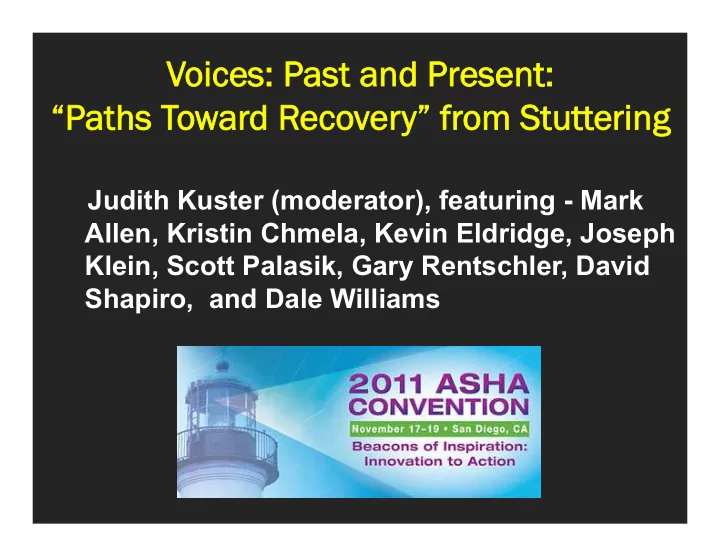

Voices: P : Past a and nd P Present nt: : “Paths hs T Toward R Recovery” y” f from S m Stuttering ng Judith Kuster (moderator), featuring - Mark Allen, Kristin Chmela, Kevin Eldridge, Joseph Klein, Scott Palasik, Gary Rentschler, David Shapiro, and Dale Williams
The he c cont ntinu nuing ng o of a a p proje ject spanni nning ng S SEVEN d decades The he b beginni nning ng In 1957 Joseph Sheehan gathered a panel of people who stutter together for the ASHA convention in Cleveland, Ohio. Fred Murray ran into Sheehan in the hall and asked if he was recording the panel. Sheehan said “No, but if you can arrange it, go ahead.” Murray scrambled and with $100 of his own money, found a person to record it!
Recordings from each decade are freely available on the Stuttering Home Page (www.stutteringhomepage.com) under “Voices Past and Present” – accessed 241 times in Oct. 2011
1957 - W - Wend ndell J ll Johns hnson r n respond nding ng t to “sho hould ld a a p psycho holo logist o or a a p psychi hiatrist be a a ne necessary p y part i in t n the he t the herapy y process w with a h a p person w n who ho s stutters?”
1968 - Lee Edward Travis raises concerns about the direction he sees the field going in relation to stuttering after the 50’s and 60’s - “Are we hearing that the stutterer can't tell us anything at all about his own stuttering? . . . Is this why we are now enjoying a kind of therapy that minimizes feelings, motives, relationship issues and emphasizes acts? . . . . treating human beings mechanicalistically. . . . . . Are we losing sight of the person? ”
Twenty years after these panels began, Fred Murray was included on the panel
1977 - Michael Tebb talked about “Getting to know the person” and the “importance of counseling.”
No “recovery” panel in the ’80’s
The voices of women who stutter were added 1996 and 2003
Additiona nal t l treasures o on t n the he Voices: P : Past a and nd P Present nt w website
I w I was s surprised t to le learn f n from m Bryng yng Bryng yngels lson a about ano nothe her s study i y in E n Eng ngla land nd t tha hat was s simi mila lar t to a a c cont ntroversial l study d y done ne i in Io n Iowa i in 1 n 1939, , thi his t time me w with a h adult lt no non- n- stutterers, t , tryi ying ng t to ma make the hem s m stutterers b by c y cha hang nging ng the heir ha hand ndedne ness.
“I swore an oath to a birch tree” CVR
Us Uses - V - Voices: P : Past a and nd P Present nt Appreciating our roots
“. . . If we are to know where we are, we should know where we were.” (1982) “If we are to know where we are going, we should know where we began.” (1982)
Uses - Voices: Past and Present Appreciating our roots Having unique participants in ISAD conferences
Past IS ISAD D onli nline ne conf nferenc nces
Tho homa mas A Ale lexand nder’s ’s p poem “ m “The he Cure” f from t m the he 1 1968 A ASHA convent ntion i n in De n Denver, C , Colo lorado
Uses - Voices: Past and Present Appreciating our roots Having unique participants in ISAD conferences Uses for research
Correspondence with Rod Gabel, Ph.D about a research project “I plan on doing a qualitative analysis of the speeches, trying to make some application of these stories to clinical practice. Sort of a retrospective outcomes study. ”
Uses - Voices: Past and Present Appreciating our roots Having unique participants in ISAD conferences Uses for research Uses for teaching
Introducing my students to the authors of some of the various texts I’ve used over the years
Us Uses - V - Voices: P : Past a and nd P Present nt Appreciating our roots Having unique participants in ISAD conferences Uses for research Uses for teaching Uses for clinical practice
Us Uses - V - Voices: P : Past a and nd P Present nt Appreciating our roots Having unique participants in ISAD conferences Uses for research Uses for teaching Uses for clinical practice Listening to the “stories” of others
Us Uses - V - Voices: P : Past a and nd P Present nt Appreciating our roots Having unique participants in ISAD conferences Uses for research Uses for teaching Uses for clinical practice Listening to the “stories” of others Being encouraged to tell their own “stories”
The he p proje ject c cont ntinu nues i in 2 n 2011, , featuring ng e eight ht o of o our c colle lleagues who ho w will s ll sha hare t the heir “ “stories”
Recommend
More recommend